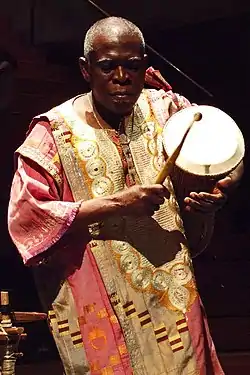Obo Addy
Obo Addy (January 15, 1936 – September 13, 2012) was a Ghanaian drummer and dancer who was one of the first native African musicians to bring the fusion of traditional folk music and Western pop music known as worldbeat to Europe and then to the Pacific Northwest of the United States in the late 1970s. He taught music at Lewis & Clark College in Portland, Oregon.[1]
Obo Addy | |
|---|---|
 Addy in 2009 | |
| Background information | |
| Born | January 15, 1936 Accra, Ghana |
| Died | September 13, 2012 (aged 76) Portland, Oregon, U.S. |
| Genres | Worldbeat |
| Occupation(s) | Musician, dancer, professor |
| Instrument(s) | Drum |
| Years active | 1969–2012 |
| Website | oboaddylegacyproject.org |
Biography
Addy was born into the Ga ethnic group in Accra, the capital city of Ghana. He was one of the 55 children of Jacob Kpani Addy, a wonche or medicine man who integrated rhythmic music into healing and other rituals. Obo Addy's earliest musical influence was the traditional music of the Ga people, but he was also influenced as an adolescent by popular music from Europe and the United States, and performed in local bands that played Westernized music and the dance music of Ghana known as highlife.[2] The Kronos Quartet commissioned a string quartet from Addy for their 1992 album Pieces of Africa.
Addy was employed by the Arts Council of Ghana in 1969, and played his native Ga traditional music in the 1972 Summer Olympics in Munich, Germany. He moved to London, England, and began touring in Europe. In 1978, he moved to Portland, Oregon in the United States, where he taught at Lewis & Clark College. He also led weekly drumming workshops at Portland's Lincoln High School.[3]
In 1989, he founded the Homowo African Arts and Cultures organization, a non-profit which sponsors the annual Homowo Festival of African Arts in Oregon.[4] The organization was later renamed as the Obo Addy Legacy Project.[2]
After a long battle with liver cancer, Addy died on September 13, 2012.[5][6]
Awards and honors
He was awarded a Master's Fellowship from the Oregon Arts Commission and Regional Arts & Culture Council, and the Oregon Governors Award for the Arts.[2] In 1996, he became the first native African[7] to win a National Heritage Fellowship from the National Endowment for the Arts, which is the highest honor in the folk and traditional arts in the United States.[8][6]
Recent albums
- AfieyeOkropong (Alula Records)
- Wonche Bi (Alula Records)
- Let Me Play My Drums (Burnside Records)
- The Rhythm Of Which A Chief Walks Gracefully (Earthbeat Records)
- Okropong (Santrofi Records)
References
- "Obo Addy: Ghanian-American Drummer". www.arts.gov. National Endowment for the Arts. n.d. Retrieved December 17, 2020.
- Baer, April (September 13, 2012). "Obo Addy Loses Battle With Liver Cancer". Oregon Public Broadcasting. Archived from the original on September 16, 2012. Retrieved January 26, 2021.
- "Obo Addy (1936-2012)". www.oregonencyclopedia.org. Retrieved 2023-07-22.
- Wyden, Ron (2000). "Portland's Homowo Festival". lcweb2.loc.gov. Retrieved 2023-07-22.
- Singer, Matthew (September 13, 2012). "Obo Addy Has Passed Away". Willamette Week. Retrieved January 1, 2013.
- "In memoriam: Obo Addy". Drummerszone. Retrieved July 22, 2023.
- O, Monica (2015-05-08). "Celebrating Traditional Music With Obo Addy". GhanaShowBiz.com™. Retrieved 2020-05-24.
- "NEA National Heritage Fellowships 1996". www.arts.gov. National Endowment for the Arts. Archived from the original on May 19, 2020. Retrieved December 17, 2020.
External links
- Obo Addy at IMDb
- "Obo Addy". The Oregon Encyclopedia.
- Obo Addy: Master Drummer home page
- "Addy vs. Addy". Zach Dundas. Willamette Week Online. February 26, 2003.
- Obo Addy page from Lewis & Clark College site
- Obo Addy page
- Article about Addy family
- Oregon Art Beat: Drummer Obo Addy